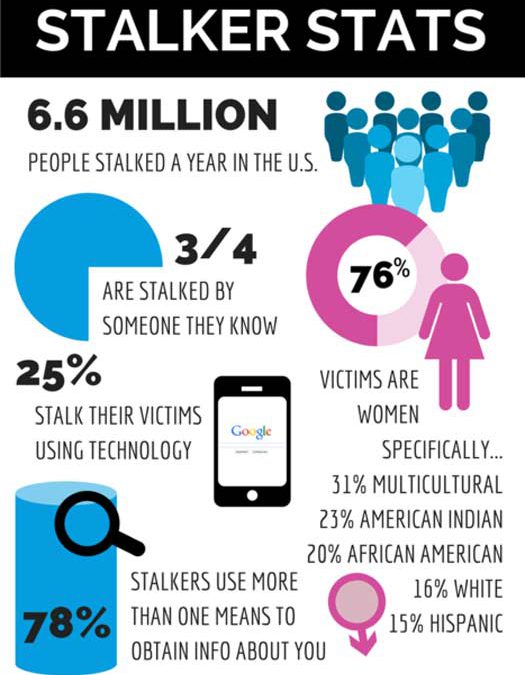STATISTICS AND STALKING
Although stalking makes for a compelling plot line in motion pictures, it can be a terrifying reality for many people, men and women alike. Statistically speaking, 1 in 6 women and 1 in 14 men will be victimized by stalkers. Stalking can take the form of voyeurism, cyberstalking and, most startling, someone watching your every move from inside of a parked car. Obviously, behavior like this is synonymous with a jilted lover, but no one is impervious to stalking.
WHAT CONSTITUTES STALKING?
Before we delve further into this topic, let’s get a clear and definitive understanding of what constitutes stalking. For those who are unfamiliar with the term, stalking is any obsessive or unwanted attention directed towards another person, typically characterized by intimidation and harassment. Additionally, many stalkers will monitor their victim’s social media accounts, namely Facebook. In fact, more than half of all stalkers will attempt to make contact with their victims through social media, which is in addition to phone calls and unannounced visits. Initially, these attempts at connecting with someone may seem innocuous, but bear in mind, this is usually just the beginning. It won’t be long before these events become more numerous and more aggressive.
WHEN TO CONTACT LAW ENFORCEMENT
It’s important to mention that not all attempts at making contact with someone denotes stalking; so, you’re encouraged to fully assess the situation before contacting law enforcement or obtaining an injunction against someone. For example, occasional calls from telemarketers or “likes” on a social media page are harmless, and they do not warrant involving authorities. However, if you believe that your life is in danger, do whatever you have to do to protect yourself, within the bounds of the law.
SHOULD YOU SPEAK WITH A THERAPIST?
One aspect of stalking that is rarely discussed is the psychological component; many stalking victims have reported feelings of anxiety, PTSD, agoraphobia, and other disorders. These disorders can have long-term effects, impeding on an individual’s ability to form healthy relationships, establish trust, etc. So, if you have been “cyber stalked,” “gang stalked,” or have experienced any other variation of stalking, you’re encouraged to speak with a therapist. There is absolutely nothing to be ashamed of; opening up about your personal experience can make you a stronger person, at least mentally.
AM I BEING STALKED?
Certain behaviors, which are exhibited by certain individuals, may be characteristic of their personality; for example, some people may naturally be very attentive, or they may be concerned about your well being if they haven’t heard from you in a while. However, you should look out for red flags that may suggest a problem. If you believe that you are being stalked, here are some things that you can do to keep yourself safe:
- Be aware of your surrounding.
- Acknowledge extreme changes in behavior.
- Obtain an injunction
- Use online background checks to identify possible signs of a stalker.
Again, stalking is romanticized in movies, but it can lead to very serious consequence if you ignore certain telltale signs. So, remain alert, and don’t be afraid to seek help from friends, family, and law enforcement if you find yourself in this situation.

